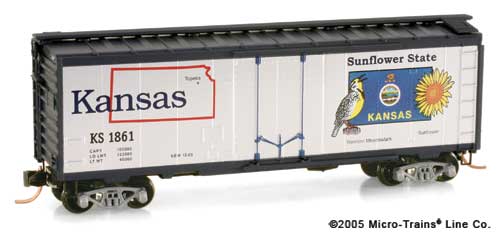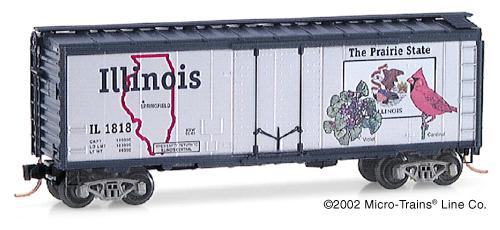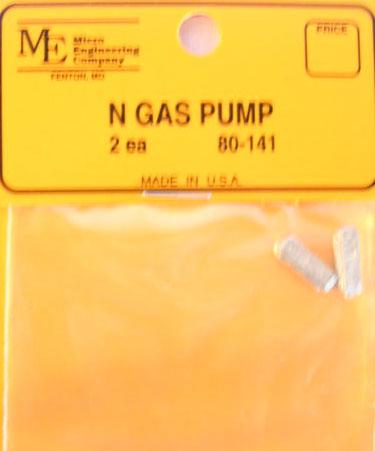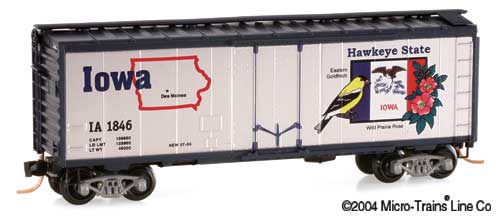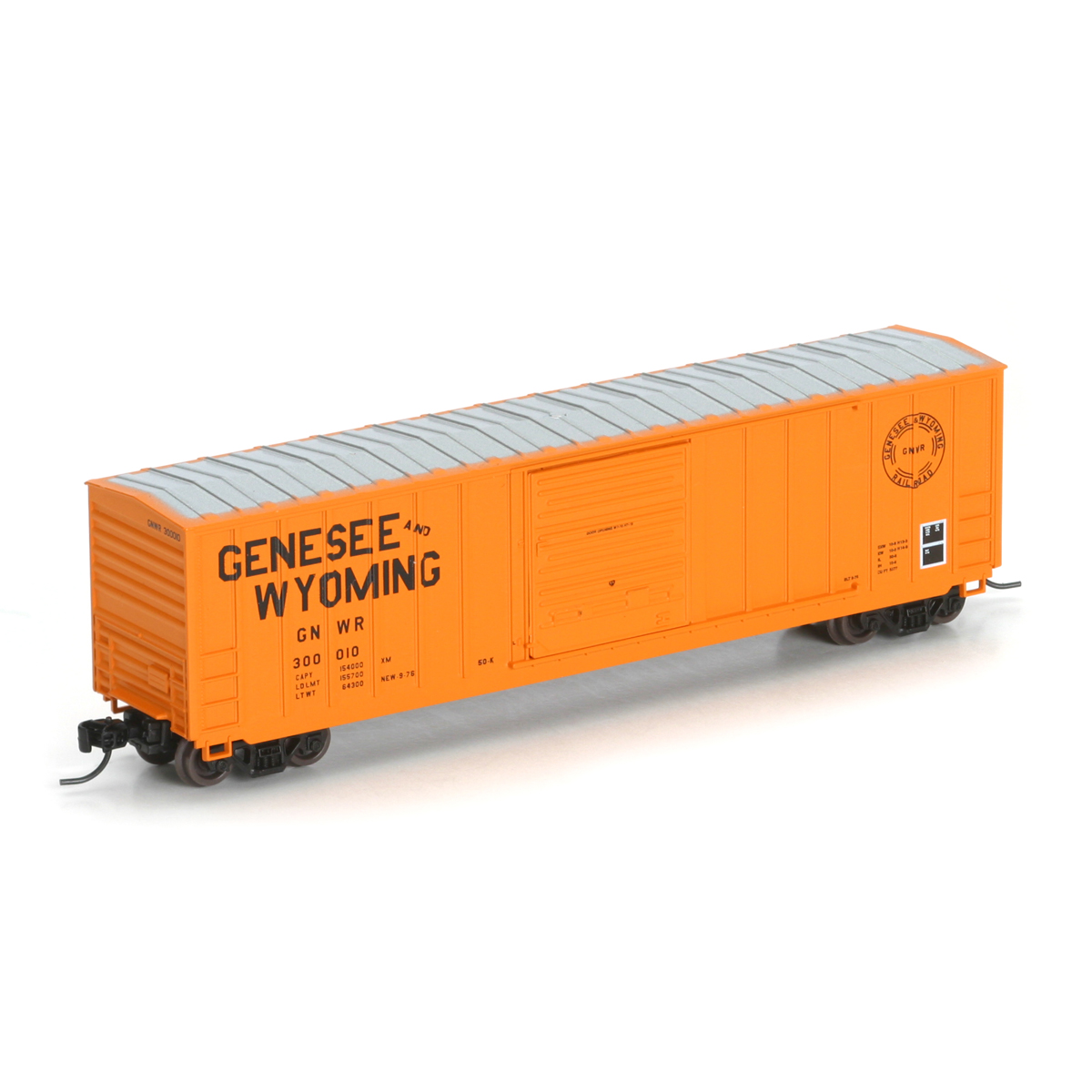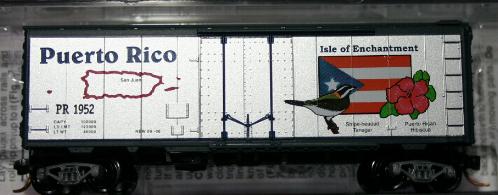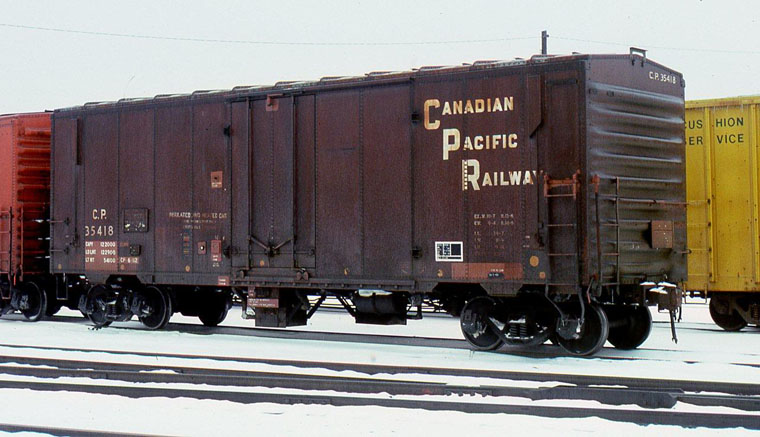Prototype History: Plug-Door boxcars are usually insulated and typically carry products such as canned goods that require protection from extremes of temperature but do not require refrigeration. Plug-style doors were normally used to ensure a tight seal in the insulation. Designed for transport of both perishables and large loads, plug doors allowed box cars to be sealed from outside dust and dirt. Cars like these were manufactured during the 50s and 60s.
Whether you consider this a reefer or a boxcar is a matter for angel-pinhead-counters. There seems to be a bit of a blurry line during the transition era between the idea of a steel ice reefer and an insulated boxcar. I guess an ice reefer was meant to hold ice for cooling but I doubt this is a cut-and-dry distinction. Modern "mechanical" reefers are a different breed as they contain a refrigeration unit which quite distinctly sets them apart from "boxcars".
Whether you consider this a reefer or a boxcar is a matter for angel-pinhead-counters. There seems to be a bit of a blurry line during the transition era between the idea of a steel ice reefer and an insulated boxcar. I guess an ice reefer was meant to hold ice for cooling but I doubt this is a cut-and-dry distinction. Modern "mechanical" reefers are a different breed as they contain a refrigeration unit which quite distinctly sets them apart from "boxcars".
Road Name History: Love it or hate it-- and there's not been all that much middle ground-- the State Car Special Edition series has been, by far, the most ambitious SE program in the entire history of Micro-Trains Line, going all the way back to 1972. Dwarfing the "Bicentennial" series, a mere fourteen releases produced in 1975 and 1976, this collection of rolling stock honored all fifty United States and also included a pair of FT locomotives and a caboose. Additional "member only" cars from the N Scale Collector's Society made by MTL in the same "look and feel" supplemented the main series; we've got those NSC cars included here as well.
Aided by a substantial marketing push in the second half of 2002, the first car in the group, January 2003's Illinois was a very quick sellout and jumped quickly to a high aftermarket premium. The second and third cars, California and New York, also command significant aftermarket values at times, but the Illinois is the key car in the series. Most of the other regular run cars, though becoming a bit harder to find, sell for a large discount to MSRP if you are patient. The NSC cars sometimes sell for more than MSRP but also sometimes not.
The series went through two catalog number changes in its history. Originally, the catalog numbers were by tens as is the practice for most MTL freight car releases. It was probably noted very quickly that the 21000's would have been almost out of numbers by the time that was completed-- the group would have ended at 21810!-- so a switch to single digit increments began with the South Dakota release, 21371. That would have ended the numbering at 21419, except that the eight digit catalog numbers began in January 2005 with West Virginia, 021 00 386.
From July 2008 through September 2012, Z Scale versions of the State Cars were issued. Please refer to the alphabetical listing here to view the release sequence, which was not the same as with the N Scale releases-- other than the Illinois car which opened the Z Scale series in July 2008. The images below are ordered by the sequence of N Scale releases... sorry, but they were done first! The N Scale Collector's Society issued only one "almost a state" cars in Z Scale, the District of Columbia.
Aided by a substantial marketing push in the second half of 2002, the first car in the group, January 2003's Illinois was a very quick sellout and jumped quickly to a high aftermarket premium. The second and third cars, California and New York, also command significant aftermarket values at times, but the Illinois is the key car in the series. Most of the other regular run cars, though becoming a bit harder to find, sell for a large discount to MSRP if you are patient. The NSC cars sometimes sell for more than MSRP but also sometimes not.
The series went through two catalog number changes in its history. Originally, the catalog numbers were by tens as is the practice for most MTL freight car releases. It was probably noted very quickly that the 21000's would have been almost out of numbers by the time that was completed-- the group would have ended at 21810!-- so a switch to single digit increments began with the South Dakota release, 21371. That would have ended the numbering at 21419, except that the eight digit catalog numbers began in January 2005 with West Virginia, 021 00 386.
From July 2008 through September 2012, Z Scale versions of the State Cars were issued. Please refer to the alphabetical listing here to view the release sequence, which was not the same as with the N Scale releases-- other than the Illinois car which opened the Z Scale series in July 2008. The images below are ordered by the sequence of N Scale releases... sorry, but they were done first! The N Scale Collector's Society issued only one "almost a state" cars in Z Scale, the District of Columbia.
Brand/Importer Information: Micro-Trains is the brand name used by both Kadee Quality Products and Micro-Trains Line. For a history of the relationship between the brand and the two companies, please consult our Micro-Trains Collector's Guide.
Manufacturer Information:  Micro-Trains Line split off from Kadee Quality Products in 1990. Kadee Quality Products originally got involved in N-Scale by producing a scaled-down version of their successful HO Magne-Matic knuckle coupler system. This coupler was superior to the ubiquitous 'Rapido' style coupler due to two primary factors: superior realistic appearance and the ability to automatically uncouple when stopped over a magnet embedded in a section of track. The success of these couplers in N-Scale quickly translated to the production of trucks, wheels and in 1972 a release of ready-to-run box cars.
Micro-Trains Line split off from Kadee Quality Products in 1990. Kadee Quality Products originally got involved in N-Scale by producing a scaled-down version of their successful HO Magne-Matic knuckle coupler system. This coupler was superior to the ubiquitous 'Rapido' style coupler due to two primary factors: superior realistic appearance and the ability to automatically uncouple when stopped over a magnet embedded in a section of track. The success of these couplers in N-Scale quickly translated to the production of trucks, wheels and in 1972 a release of ready-to-run box cars.
Micro-Trains Line Co. split off from Kadee in 1990 to form a completely independent company. For this reason, products from this company can appear with labels from both enterprises. Due to the nature of production idiosyncrasies and various random factors, the rolling stock from Micro-Trains can have all sorts of interesting variations in both their packaging as well as the products themselves. When acquiring an MTL product it is very important to understand these important production variations that can greatly enhance (or decrease) the value of your purchase.
Please consult our Micro-Trains Collector's Guide

Micro-Trains Line Co. split off from Kadee in 1990 to form a completely independent company. For this reason, products from this company can appear with labels from both enterprises. Due to the nature of production idiosyncrasies and various random factors, the rolling stock from Micro-Trains can have all sorts of interesting variations in both their packaging as well as the products themselves. When acquiring an MTL product it is very important to understand these important production variations that can greatly enhance (or decrease) the value of your purchase.
Please consult our Micro-Trains Collector's Guide
Item created by: Lethe on 2015-05-31 17:46:30. Last edited by Lethe on 2020-05-07 00:00:00
If you see errors or missing data in this entry, please feel free to log in and edit it. Anyone with a Gmail account can log in instantly.
If you see errors or missing data in this entry, please feel free to log in and edit it. Anyone with a Gmail account can log in instantly.


